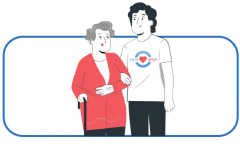Holiday Blues are Common for Seniors
BE ON THE LOOKOUT FOR LONELINESS AND DEPRESSION
The holiday season is joyous for many of us, but it’s also a time that can trigger grief and depression – especially in older adults. Seniors are not always able to share the holidays with loved ones, which leaves them vulnerable to loneliness and isolation.  Adults who have been diagnosed with dementia may have an especially hard time. Aging Care, from A Place for Mom, published a piece authored by a person diagnosed with dementia, and he details the various challenges in a very compelling way. Here is one of his entries:
Adults who have been diagnosed with dementia may have an especially hard time. Aging Care, from A Place for Mom, published a piece authored by a person diagnosed with dementia, and he details the various challenges in a very compelling way. Here is one of his entries:
“The house looks and feels different, which worsens my confusion. Having to be at a certain place at a certain time is increasingly difficult because of my limited sense of time. With throngs of people, there are plenty of opportunities for forgetting names and faces, and crowds make conversations particularly difficult to follow.”
The National Council on Aging offers great information and tips on how families can deal with stress and the emotional ups and downs of the holiday season. Even the new year will be difficult for some folks, especially those who have lost a partner or experienced a recent injury. Families and caregivers should do their best to be sensitive to the needs of these loved ones and attempt to include them in activities whenever possible.
SCAM ALERT
TV Celebrity-Pastor Charged with Identity Theft
A Tennessee pastor who once sung his way onto the television shows American Idol and The Voice has been charged with felony identity theft and theft of merchandise. Steven “Stevie” Flockhart, chief pastor of the 901 Church in Memphis, gained a measure of fame more than 10 years ago when he appeared on the TV shows that highlight dramatic vocal competitions in front  of an audience.
of an audience.
But Flockhart’s recent brush with celebrity is of an altogether different nature. According to his arrest affidavit, Flockhart and a member of his congregation opened a credit card for the church a few years ago. Recently, however, the church member learned that his own credit score had fallen, and that a different PayPal credit card had been opened in his name with a balance of $6,410.
These discoveries led to Flockhart’s recent arrest. The singing pastor chose not to enter a plea at a preliminary hearing in Shelby County Criminal Court on November 6. He is currently on leave from his pastoral duties, and the church is conducting its own investigation. According to the arrest affidavit, Flockhart was previously accused of forging documents and impersonating an account holder in a George church in 2020.
* * * * * * * * * *
Hearing Device Scams on the Rise
The marketplace of hearing aids is growing rapidly, and scammers are paying attention. Almost 30 million Americans now have such devices, and experts say the number of adults who could benefit from them is actually much higher. In 2022, the Food and Drug Administration (FDA) took a major step to expand consumer choice by allowing hearing aids to be sold over the counter. The idea was that increased competition would lower prices and spark innovation.
Yet the introduction of over-the-counter hearing aids had an unintended side effect. It raised the risk of elder fraud, attracting unscrupulous vendors and scammers into a marketplace that many consumers do not fully understand.
Age-related hearing loss is extremely common, affecting an estimated 65% of Americans age 71 and over, with the percentage increasing at more advanced ages. Those numbers add up to millions of potential targets for scammers.
That in mind, the National Council on Aging (NCOA) has posted a list of seven warning signs consumers should watch for when they are shopping for hearing aids:
- Unknown brand names. If a company’s name is invisible online, that is a reason to be cautious about making a purchase. Established, reputable companies can typically be found – and researched – in reviews and consumer websites.
- Vague or misleading labels. If you are shopping for a hearing aid, the product should be specifically identified as a hearing aid. [Under FDA rules, an over-the-counter hearing aid should be marked “OTC hearing aid.”] Products known as “personal sound amplification devices,” which are sometimes used by hunters and birdwatchers, among others, are not intended to address hearing loss.
- Fake FDA registration certificates. Don’t be fooled by official-looking paper. The FDA does not provide such certificates for medical devices. These are phony documents meant to impress you.
- Surprisingly low prices. We all like a good deal, but be aware of typical market rates – and be wary of a product that costs much less. If you are buying a hearing aid, the NCOA advises consumers to spend enough money to ensure that the device fits properly.
- No trial period or warranty. It can take time to get used to a hearing aid and learn how to use it properly. That makes it important to have a trial period. States commonly require trial periods of at least 30 days so buyers can return a device if need be.
- Lack of customer support. It should be easy to find contact information on a company’s website. Just look for “customer support” or “contact us.” If this information is hard to find, something may be amiss.
- Rosy, unsubstantiated promises. Watch out for claims that a product will “cure” hearing loss or that it features the same technology as devices that cost a great deal more. Hearing aids often make it much easier to hear, but they are not a cure for hearing loss.
Under FDA rules, you do not have to get a hearing exam to buy an over-the-counter hearing aid. Nonetheless, consumers may benefit from consulting with a licensed hearing professional such as an audiologist, according to the NCOA. This enables you to gain important information about your hearing needs and what exactly to look for in a potentially confusing marketplace
For a variety of health and safety reasons, it is important for people with hearing loss to take care of it – if possible. Awareness of the Seven Warning Signs can help you achieve this goal safely and effectively.
GOVERNMENT / LEGISLATIVE UPDATE
SECURE ACT SET TO IMPROVE RETIREMENT FOR AMERICANS
 Congress passed the Setting Every Community Up for Retirement Enhancement Act (SECURE Act) four years ago to help Americans in their retirement years. In 2022, the SECURE 2.0 Retirement Savings Act (“SECURE Act 2.0”) was enacted, which expanded the original SECURE Act and offered even more benefits. A number of the provisions of this expansion will begin in 2024, and subsequent years. One of them relaxes the rules for taking Minimum Distributions (“RMDs”). A summary of other benefits of the SECURE Act can be found here. In that more than a quarter of unretired Americans have not adequately saved for retirement, the Secure Act 2.0 is meant to ensure that aging Americans lead better, more secure lives.
Congress passed the Setting Every Community Up for Retirement Enhancement Act (SECURE Act) four years ago to help Americans in their retirement years. In 2022, the SECURE 2.0 Retirement Savings Act (“SECURE Act 2.0”) was enacted, which expanded the original SECURE Act and offered even more benefits. A number of the provisions of this expansion will begin in 2024, and subsequent years. One of them relaxes the rules for taking Minimum Distributions (“RMDs”). A summary of other benefits of the SECURE Act can be found here. In that more than a quarter of unretired Americans have not adequately saved for retirement, the Secure Act 2.0 is meant to ensure that aging Americans lead better, more secure lives.
Seniors, Students & Tech
AN INNOVATIVE INTERGENERATIONAL PROGRAM
An exciting new app is pairing college students and older adults. Students who are interested in aging and caregiving can now gain college credits through a healthcare tech tool called CareYaya. In a nutshell, potential caregiver – students from universities  are vetted through interviews, background checks, and community reviews. According to the website, “students are motivated by a vested interest in helping and connecting as they prepare for future healthcare careers, not just financial reward.” Care Yaya’s platform uses artificial intelligence to connect students to seniors in their area and it now offers art therapy tools to its users. While the new app is focused on adults living independently, many of the students are now using the Yaya caregiver training to pursue work in a long-term care setting. Some of its features are designed to help seniors who have cognitive challenges by using art and image therapy to prompt memory recall. Programs that join students and seniors thorough the use of technology are sure to be the wave of the future.
are vetted through interviews, background checks, and community reviews. According to the website, “students are motivated by a vested interest in helping and connecting as they prepare for future healthcare careers, not just financial reward.” Care Yaya’s platform uses artificial intelligence to connect students to seniors in their area and it now offers art therapy tools to its users. While the new app is focused on adults living independently, many of the students are now using the Yaya caregiver training to pursue work in a long-term care setting. Some of its features are designed to help seniors who have cognitive challenges by using art and image therapy to prompt memory recall. Programs that join students and seniors thorough the use of technology are sure to be the wave of the future.
Illustration Credit: www.CareYaya.org